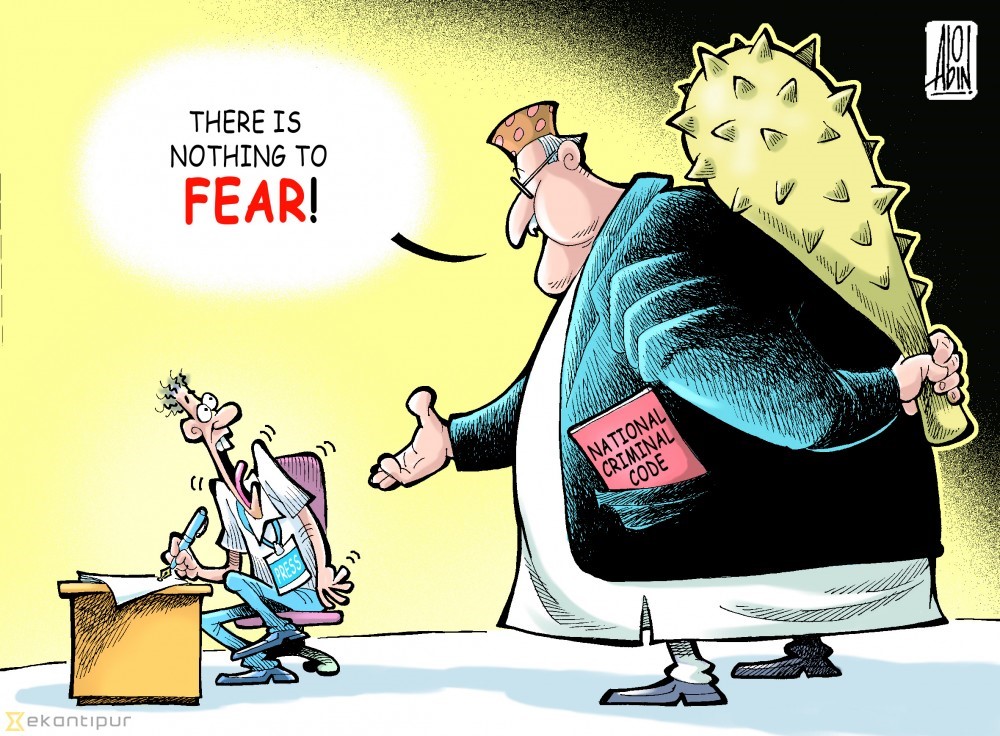The Criminal Codes Act 2017 and Civil Codes Act 2017, became law on August 17, 2018, replacing 15 laws including 55-year-old civil and criminal laws. The new laws were passed by the Legislative Parliament in October 2017 with an aim to amend and consolidate all the existing criminal laws and civil laws into one document. Some provisions in the Criminal Codes Act 2017 have been criticized for restricting freedom of expression and press freedom.
The Federation of Nepali Journalists (FNJ) and the Nepal Press Union (NPU), as well as other media stakeholders, have expressed concerns and demanded amendments to some of the provisions. According to FNJ and NPU, Provisions relating to privacy and defamation, contradict ‘complete press freedom’ and other rights of the citizens guaranteed by the Constitution of Nepal.
The FNJ’s Executive Committee meeting in Lumbini on August 8 and 9 urged the government to amend the contradictory provisions to ensure the Acts are press freedom friendly. The NPU jointly with the Center for Media Research – Nepal organized an interactive program on August 15 in which most of the participants expressed concerns over some provisions of Criminal Codes Act saying that they interfere with the journalism. The Nepal Media Society, the association of media owners, has also demanded amendments in the provisions.
FNJ’s former president Dharmendra Jha says: “The Act, if implemented as they are, will affect journalism as some of the new provisions in the Act are restrictive to freedom of expression and press freedom.”
The Controversial Provisions
The provisions that were highlighted as problematic are Sections 293 to 308. Those provisions relate to privacy and defamation; and if proven guilty, the accused faces up to three years of imprisonment.
- Section 293 prohibits listening or recording conversations between two or more people without consent or authority. Violations are punishable by up to two years of imprisonment and/or Rs. 20,000 (USD 200) fines. Journalists say this provision will kill investigative journalism.
- Section 294 prohibits publicizing private information of others found during professional works without consent or authority. Violations are punishable by up to one year in prison and/or Rs. 10,000 (USD 100) fine.
- Section 295 prohibits taking photos without consent, and violations are punishable by up to two years in prison. Section 296 prohibits giving away or selling photos or publication of photos for commercial purpose without the consent of the subject in the photographs.
- Section 298 prohibits receiving or sending unauthorized information or messages on an electronic medium and publishing them.
- Section 305 prohibits slander; Section 306 prohibits libel, including those in satirical ways. Section 307 states that slander and libel are punishable by up to two years in prison, and lander and libel through electronic or mass media are punishable by further one year.

Private or public life?
“There is a problem with the provisions on privacy and defamation. Despite being good overall, the problem is that the Act does not differentiate between the private and public life of people,” FNJ’s former president and the editor at the Center for Investigative Journalism (CIJ) Shiva Gaunle says. “Journalists should have the right to report and write about the public life of people.”
While the Civil Codes Act 2017 mentioned that the provisions on privacy and defamation are not applicable when they are of public life and public importance, the Criminal Codes Act 2017 doesn’t mention it. Gaunle believes this is the main concern of the journalists and curtails the rights of the journalists.
FNJ Secretary Ram Prasad Dahal says: “Beginning August 17, 2018, Nepali journalists will be working with a sword hanging over their head. The FNJ is very concerned and we will struggle for the rights of the journalists to ensure people’s rights to information is fulfilled.”
Ambiguity and scope for misuse
The major concerns over the Criminal Codes Act 2017 are on the ambiguity in the provisions that leaves enough scope of misuse.
Prime Minister KP Sharma Oli accused the opposition parties of fueling unnecessary controversy regarding the Act and claimed that the Acts contained no provision negatively affecting Nepali citizens.
Former Chief Justice Kalyan Shrestha, who was in the drafting committee of the Acts, claims that the new laws do not restrict press freedom. He says: “The journalist does not have to go to prison if the case is registered, s/he is only punished if s/he is proven guilty.”
Although the new Act is much more comprehensive than earlier laws, they still leave space for the misuses. The Act does not speak on media or press, thus there are chances of cases being registered for investigative stories and critical stories. The motive of journalism is to bring forward information intended to be hidden, and such work could be punished or at least journalists are harassed by registration of complaints.
Nepali media and journalists have witnessed the misuse of Clause 47 of the Electronic Transaction Act, which was used repeatedly against journalists to put them in custody for a few days, although in all, except in a couple of the cases, the journalists were found not guilty.
“The provisions related to consent on photography can be misused to harass photojournalists and media,” Bikash Karki, the chairman of the Photojournalists’ Club Nepal says. “The threat of misuse of the provisions will not allow photojournalists to work in the way we have worked in the past.”
(Originally published in the SAMSN Digital Hub.)
